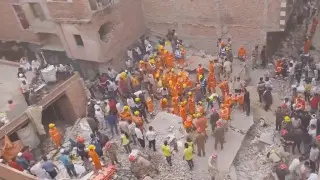
X
The residents of Delhi woke up to a smoggy morning on Friday, October 27. The air quality in the national capital continues to remain in ‘Poor’ category with the Air Quality Index (AQI) recorded at 249 as per the System of Air Quality and Weather Forecasting and Research (SAFAR)-India.
The latest data from SAFAR shows that the air quality around Delhi University was recorded at 307 (Very Poor) in the morning hours today. The IIT area and the Lodhi Road in New Delhi were at 273 and 218 respectively with both falling under the 'Poor' category.
#WATCH | Overall air quality in the 'Poor' category in Delhi today
— ANI (@ANI) October 27, 2023
Visuals from Kartavya Path, India Gate pic.twitter.com/DhT4KYk5Ot
According to the data, Noida also recorded an AQI of 208 while Gurugram was at 252 either of which falls in the 'Poor' category.
A statement was released by the Indian Meteorological Department on Delhi’s AQI stating that predominant surface wind is likely from Northwest/Northeast directions in Delhi with wind speed of 04-16 kmph, resulting in mainly clear sky and mist in the morning on Friday.
Moreover, an anti-smog gun sprinkled water in the Anand Vihar area on Thursday, to mitigate pollution.
As stubble burning continues in parts of Punjab and Haryana, air quality in the national capital has worsened in the past few days. According to data, over 2,500 cases of stubble burning have been reported this year so far. However, farm fire numbers are better than those of the previous two years.
The second phase of the Graded Response Action Plan (GRAP) was implemented in Delhi to reduce the effect of increased pollution.
Graded Response Action Plan (GRAP) is a set of guidelines and measures implemented to combat air pollution in the National Capital Region (NCR) of India, which includes Delhi and its surrounding areas.
As per a government release issued by the Ministry of Environment, under GRAP-2 restrictions in Delhi NCR, there will be a ban on the use of coal and wood-fired stoves, the frequency of CNG and electric buses will be increased, regular cleaning of roads and a sprinkling of water on them to be done, traffic police personnel to ensure there are no traffic jams so that pollution can be controlled.
(With ANI Inputs)













Copyright © 2025 Top Indian News
